|
|
|
Sort Order |
|
|
|
Items / Page
|
|
|
|
|
|
|
| Srl | Item |
| 1 |
ID:
110460
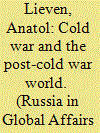

|
|
|
|
|
| Publication |
2011.
|
| Summary/Abstract |
Rather than a future in which Chinese hegemony will replace that of the United States, we seem to be rapidly entering a world in which no country will exercise anything resembling true world leadership. This bears a sinister resemblance to the 1920s, when the United States replaced Britain as the world's leading economic power, but was wholly unwilling to shoulder additional burdens of global leadership.
|
|
|
|
|
|
|
|
|
|
|
|
|
|
|
|
| 2 |
ID:
110316


|
|
|
|
|
| Publication |
2012.
|
| Summary/Abstract |
OF ALL the U.S. presidents since Franklin Roosevelt, none stands taller in history or exercises a greater lingering influence on American politics than Ronald Reagan. Republican politicians invoke his name as example and lodestar, and Democrats have granted him increasing respect as the passions of his presidential years have ebbed with time. Surveys of academics on presidential performance, initially dismissive, now rank him among the best of the White House breed. Even President Obama has extolled his approach to presidential leadership.
|
|
|
|
|
|
|
|
|
|
|
|
|
|
|
|
| 3 |
ID:
129066
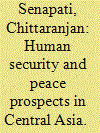

|
|
|
|
|
| Publication |
2014.
|
| Summary/Abstract |
Central Asia has always been a blend of cultures due to its massive migrations and the mixing of peoples coming from outside. In this context this mixture of people in many ways reflected both the best and the worst that each group had to offer. ln the "Great Game" of the Nineteenth century influ-ences from the North and the South played a part in shaping the region'. This unique blend of peoples and cultures are not seen elsewhere in the world (Table 1). To manage this blend of people will always be difficult. So most of the time this bland poses the issues of conflict and insecurity. Be that it is, human security can be an approach to provide security to Central Asian countries. However, in early 1990s, the fall of Berlin Wall (1989), demise of the soviet communism and ascendancy of the neoliberal global regime, altered the international power structure from bipolar to multi-polar world order and this has resulted into the emergence of new security concerns like global terrorism, environmental issues, energy security, food security etc. In the new complicated situation the Central Asian Republics (CARS) have been goaded to rethink the very notion of security from different perspectives.
|
|
|
|
|
|
|
|
|
|
|
|
|
|
|
|
| 4 |
ID:
112860
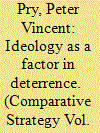

|
|
|
|
|
| Publication |
2012.
|
| Summary/Abstract |
History is replete with examples of deterrence failure and war occurring unexpectedly, taking nations by surprise, because of failure to comprehend an adversary's ideology. The modern world has been shaped by failure to comprehend the ideologically driven aggression of Nazi Germany, Imperial Japan, Soviet communism, and Islamic jihadism. The Soviet "war scare" during NATO's nuclear exercise ABLE ARCHER-83 exemplifies how ideology could cause deterrence failure and even nuclear war. Understanding the ideology of potential adversaries must be part of any informed deterrence strategy. U.S. overconfidence in deterrence theory, which is itself an ideological belief system, could contribute to deterrence failure.
|
|
|
|
|
|
|
|
|
|
|
|
|
|
|
|
| 5 |
ID:
115059
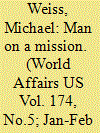

|
|
|
|
|
| Publication |
2012.
|
| Summary/Abstract |
There, but for an accident of geography, stands a corpse!" thundered Max Shachtman-once known as Leon Trotsky's "foreign minister"-in New York City in 1950. By popular account, the line had been cooked up that night by a young Shachtmanite named Irving Howe; it ended the debate between the anti-Stalinist socialist Schachtman and his opponent, Earl Browder, former head of the Communist Party USA, who had been expelled from the party in 1946 at the behest of Moscow Central after suggesting that Soviet Communism and American capitalism might coexist after all.
|
|
|
|
|
|
|
|
|
|
|
|
|
|
|
|
| 6 |
ID:
058879
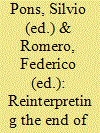

|
|
|
|
|
| Publication |
London, Frank Cass, 2005.
|
| Description |
viii, 237p.Pbk
|
| Series |
Cass Series:Cold War History
|
| Standard Number |
0714684929
|
|
|
|
|
|
|
|
|
|
|
|
Copies: C:1/I:0,R:0,Q:0
Circulation
| Accession# | Call# | Current Location | Status | Policy | Location |
| 049156 | 909.825/PON 049156 | Main | On Shelf | General | |
|
|
|
|
| 7 |
ID:
155570
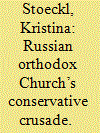

|
|
|
|
|
| Summary/Abstract |
The Russian Orthodox Church has emerged as a powerful force for cultural, social, and political conservatism.
|
|
|
|
|
|
|
|
|
|
|
|
|
|
|
|
| 8 |
ID:
090001
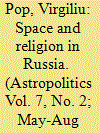

|
|
|
|
|
| Publication |
2009.
|
| Summary/Abstract |
This article follows the evolution of the relationship between the Russian space program and spirituality from an astrosociological perspective. It demonstrates that the Russian space program has its roots in Nikolai Fedorov's Cosmism, which envisaged the technological resurrection of the dead and space colonization, and in Marxism, which used space exploration as a means of proving atheism. Whereas the conquest of space has been perceived throughout the world in an ambivalent way, either as an act endorsed by Divinity or as a blasphemous feat, the Soviets took pride in reinventing the "Tower of Babel" in order to "make a name for themselves" and dethrone God (Genesis 11:4). Moreover, the technological miracles of spaceflight and the worship of Yuri Gagarin support the view that Soviet Communism was a state religion. After the fall of the Soviet Union, Orthodox Christianity brought its own contribution to the Russian space program. It will be also shown that, even during the Soviet period, appearances contrasted with the feelings of many of the cosmonauts.
|
|
|
|
|
|
|
|
|
|
|
|
|
|
|
|
|
|
|
|
|